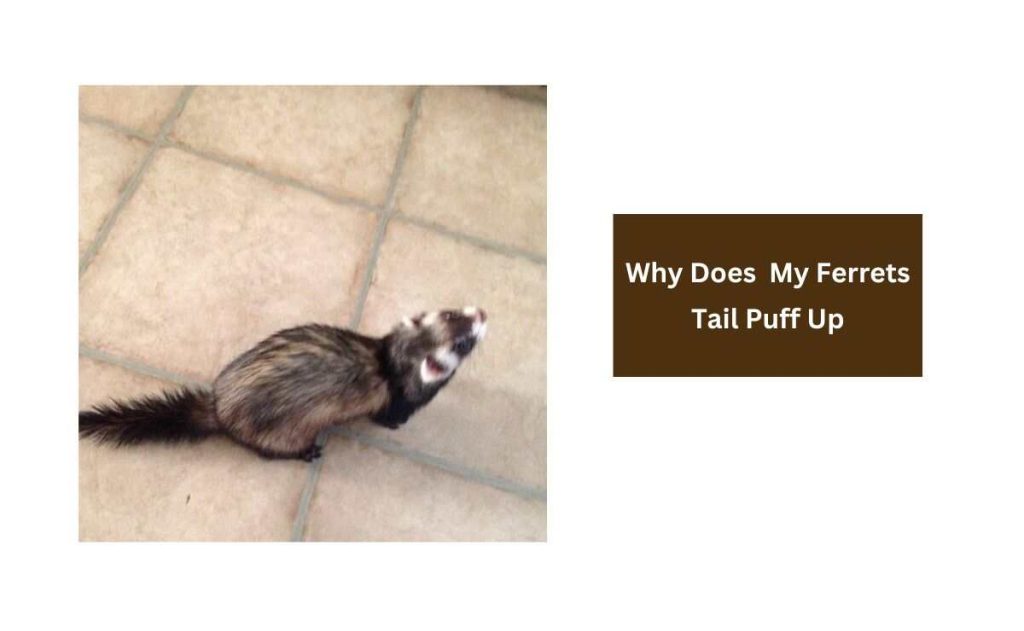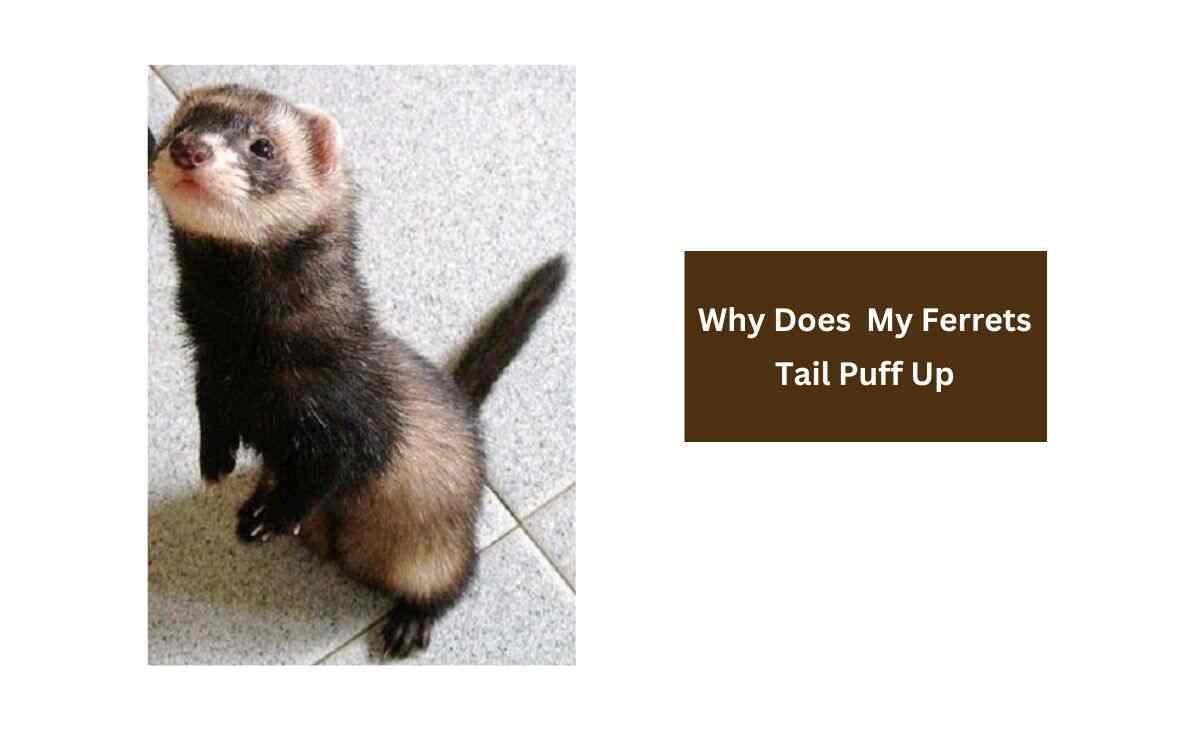Ferrets are very playful and mischievous in nature, yet we love them. If you’re a ferret owner, you’ve probably noticed its tail puff up from time to time and wondered: why does my ferrets tail puff up?
The truth is, there are several reasons why a ferret’s tail may puff up. It’s not because they’re angry at you or plotting a takeover of your home. It is a sign of some emotion like excitement, stress, or fear.
Why Does My Ferrets Tail Puff Up?

When a ferret’s tail puffs up, it is a sign that they are experiencing some sort of heightened emotion. This can include excitement, fear, aggression, or even just being startled. The puffing of the tail is a visual signal to other ferrets or animals that they should be cautious or stay away.
In the wild, ferrets use their puffed-up tails as a defense mechanism. By making themselves appear larger and more intimidating, they hope to deter potential predators or threats. Domesticated ferrets still have this natural instinct, this is why you can notice their tails puff up during certain situations.
You must notice that not all ferrets will show this behavior, and it can vary from individual to individual. Some ferrets may have a more mellow temperament and rarely puff up their tails, while others may be more prone to displaying this behavior.
If you notice your ferret’s tail puffing up frequently or responding to specific triggers, it’s a good idea to observe their behavior and identify the cause. This can help you understand your ferret better and anticipate their needs and reactions.
Common Reasons For Ferret’s Tail Puff-up
Expression Of Happiness
Ferret’s puffy tail can be a clear sign of excitement and happiness. During playtime, ferrets may gleefully “poof” their tails, signaling their cheerful mood and eagerness to engage.
Temperature
Ferrets possess a built-in mechanism to combat the cold. If your ferret feels a chill in the air, their tail might puff up as part of a natural response to trap warm air and maintain body heat.
Genetic Flair for Fluffiness
Just as human genetics influence physical traits, ferrets feature genetic diversity leading to unique features. Some ferrets are genetically inclined to have fluffier tails, making it a delightful characteristic that sets individuals apart.
Curiosity on Full Alert
When your ferret encounters something intriguing or captures their attention, the tail may stand at attention as well. It’s a sign of intense focus and interest as if the ferret is gearing up to investigate or explore the newfound curiosity in their environment.
Caution and Apprehension
On the flip side, a puffed-up tail can also be a signal of wariness or mild apprehension. If your ferret senses something unfamiliar or perceives a potential threat, the tail might poof as a defensive response.
As a result, the ferret appears larger, deterring whatever has caught its attention visually.
Why does my ferret’s tail puff up when I pet him?
As you know ferrets puff up their tails to show excitement, happiness, satisfaction, or fear. If you have a good bonding with your ferret and it loves your attention, then it can puff up its tail when you pet him.
The puffed-up tail actually is the context of petting and showing a harmonious blend of comfort, pleasure, and a genuine connection between you and your ferret. As the tail puffs with joy, it’s an invitation to continue the delightful interaction and strengthen the bond with your ferret.
What Should I Do If My Ferret’s Tail Puffs Up?
Ferrets can puff up their tails for various reasons. It depends on their mood. You need to understand the surrounding conditions to understand the appropriate course of action.
When your ferret is bouncing, pawing, and a generally animated demeanor, it is a sign of their playfulness. Ferrets adore wrestling and playful interactions. Join the game, whether it’s with your hand, a toy, or any ferret-friendly plaything. Remember, engaging playtime is vital for their happiness.
Sometimes ferrets puff their tail for sniffing and investigating the surroundings. You should grant your ferret the freedom to explore. They’re on a mission to unravel the mysteries of your home. Allow them the time to satisfy their curiosity, and as their interest wanes, the tail should return to its usual state.
Along with puff tail, if your ferrets appear in defensive postures and attempt to ward off interaction, it is sign of distress. Respect their need for space. If someone or something is causing distress, you should create a calm environment. If there are potential injuries, consider a vet visit.
Remember, each puff-up tail is a unique expression of your ferret’s emotions. By attuning yourself to their signals, you can create an environment that nurtures their happiness and ensures a pleasant bond between you and your pet.
When A Ferret Wags Its Tail?
As adorable as they are, ferrets can sometimes leave you puzzled with their behavior. One behavior that may have caught your attention is when a ferret wags its tail.
Unlike dogs, a wagging tail in ferrets does not always indicate happiness or excitement. In fact, tail wagging in ferrets can have several different meanings depending on the context.
One common reason why ferrets wag their tails is to express excitement or anticipation. This can happen when they are playing or about to receive a treat or reward. You may notice their tail wagging rapidly and their body showing signs of excitement such as bouncing or hopping.
On the other hand, a slower wagging tail can indicate fear or aggression. If a ferret is feeling threatened or uncomfortable, they may wag their tail slowly as a warning sign. This is often accompanied by other body language cues like flattened ears and arched back.
It is important to pay attention to these signs and give your ferret space if they are displaying this behavior.
Moreover, some ferrets wag their tails as a form of communication during social interactions. This is especially common during play or when two ferrets are bonding. It can be a way for them to express their intentions and engage in a friendly manner.
Lastly, tail wagging in ferrets can sometimes be a sign of illness or pain. If you notice your ferret’s tail wagging in unusually or accompanied by other symptoms like lethargy, loss of appetite, or changes in behavior, it is crucial to consult a veterinarian as these may be indications of a health issue.
Conclusion
The puffing up of a ferret’s tail is a natural and normal behavior. It’s just their way of communicating their emotions and asserting themselves.
So don’t be alarmed if you see your ferret’s tail puff up – it’s just a part of their unique and fascinating nature.
